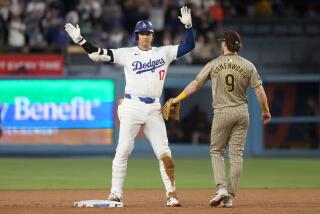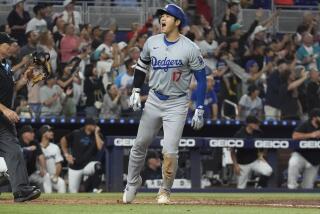Bonds in 60 Club, but Is It Still Exclusive?
- Share via
PHOENIX — From their vantage point atop thousands of singles and doubles, potential mileposts on their way to Cooperstown, Mark Grace and Tony Gwynn have an oft-tested appreciation for the difficulty of hitting home runs and towering respect for Barry Bonds. Grace and Gwynn call Bonds the best player of their era and say his ascent to 60 home runs--the fastest in 141 games and oldest at 37 to do it--is a feat both incredible (Grace’s description) and amazing (Gwynn’s), particularly because there is also the consuming pressure of a pennant race and he is being pitched to cautiously, leading the major leagues in walks and already on the verge of a career high.
“It’s almost as if every time he’s hitting the ball he’s hitting it out of the park,” said Gwynn, here with his San Diego Padres to face Grace’s Arizona Diamondbacks: “I mean, they ain’t pitching to him and he’s got 60 home runs, 60 stinking home runs. I can’t even imagine what that feels like. You’ve got to get tired just jogging around the bases 60 times, but he’s that good. I’ve always said Barry is the best player in the league, but it’s taken something like this to wake people up and now everybody is saying, ‘Hey, that Bonds is having a pretty good year.’ It’s the taken-for-granted syndrome.”
Said Grace, who led the major leagues in hits during the ‘90s: “The guy is going to hit 600 or more home runs and steal 500 to 600 bases. My God. He’s our modern Willie Mays and Mickey Mantle. I’ve always said he’s the best player I’ve ever played against, and he seems to be getting even better with age.”
No one questions the talent. As Gwynn noted, Bonds has won the National League’s most-valuable-player award three times and “how many more could he have won and should have won?”
The issue, as Bonds tries to lead the San Francisco Giants into the playoffs and battles the September calendar in what he claims is a secondary effort to eclipse Mark McGwire’s record of 70 home runs in a season, isn’t the man (although a little more amiability and less arrogance would be nice) but the mystique of those numbers.
Is it still there, or has 60 become so commonplace amid baseball’s inflated offensive statistics, to have lost its meaning?
After all, it was once the most private club. Then, Roger Maris joined Babe Ruth, and it was 37 years before anyone else hit 60 or more.
Now, in the last four seasons, three players--McGwire, Sammy Sosa and Bonds--have done it five times, and there is still a chance, with three weeks to go, Sosa could do it again and that Luis Gonzalez could join the club.
Are we numbed by the numbers, jaded by the frequency?
“I don’t think it’s taken away from the accomplishment, but I do think it’s taken away from the fans’ perception,” said Tom Hirdt of the Elias Sports Bureau, baseball’s official statistical house. “In ’98 [when McGwire and Sosa staged their Great Chase and both eclipsed the longstanding Maris record of 61 homers before finishing with 70 and 66, respectively] most fans had never seen that before and now we’ve seen it five times. Obviously, it’s not going to be as exciting.”
Besides, Hirdt said, McGwire didn’t break the record, he demolished it, putting the prize so far out there that Bonds will have to get to 65 or so before there’s any substantive sense of national drama. Even then, however, there will not have been that 37-year buildup and the two-way race between the hulking, accessible McGwire and charismatic Sosa. Bonds has so often shunned the media and failed on the national stage in the playoffs that he tends to only connect with fans when connecting in the batter’s box, which he has done with such frequency amid the walks he has generated slugging and on-base percentages that are almost as amazing as his home run ratio.
“It doesn’t matter what they throw him, if they leave it in his zone, he doesn’t miss it,” Grace said. “As a guy who doesn’t hit many home runs, I know how hard that is. There’s no way anyone should rain on his parade.”
Gwynn agreed, saying that while some people may feel the thrill is gone because of the frequency with which 60 has been breached recently, “It’s still damn hard to do. I’ve played 20 years, won eight batting titles, had 3,000 hits, and you could take my best five years and they probably wouldn’t add up to 60, maybe not even 50. The thing about Barry is ... he hit [a career-high] 49 last year. It’s not as if he stepped into a phone booth and came out Superman.”
Perhaps not, but Bonds does travel with a personal trainer and nutritionist, and if there is a difference, Grace said, it’s that “Barry is now huge. I mean, he used to be my size [about 6 feet 2 and 200 pounds] and now I stand next to him when he’s on first base and it’s embarrassing, he’s so much bigger than I am. I don’t think the Babe ever lifted weights.”
The litany is familiar: bigger and stronger players, smaller ballparks, diluted pitching, tighter strike zones and an emphasis on home runs and offense to the extent that hitters no longer worry about their strikeout totals.
“When you see two guys break a 37-year-old record [as McGwire and Sosa did in ‘98] it throws up red flags and you have to ask, ‘What’s up?”’ statistician Hirdt said. “I think there are two legitimate factors. Athletes are bigger, stronger and better. I mean, in every individual sport where time and distance are the criteria, records are being broken every day. Why would a team sport be different? Secondly, aside from maybe Comiskey in Chicago and Comerica in Detroit, every park built in the last 20 years has favored hitters.”
With all of that, Bonds has produced a new home run assault in a season in which there have been about 300 fewer home runs hit than last year, the result, perhaps, of an erratic strike zone that has left hitters guessing amid the attempt to uniform the zone and the emergence of a fleet of impressive young pitchers.
“The game goes in cycles,” Gwynn said. “Sure, I think there’s an emphasis on home runs at the expense of some other important aspects, but it’s what the game is all about now and what fans come to see. However, sooner or later we’re going to see guys hitting .400 again and then people will say, ‘Whatever happened to the home run?’ The impressive thing I see with guys like Bonds, Sosa and Gonzalez is that they’ve made an attempt to become complete players. They take their walks, they hit for average, they consistently get the big hits. I mean, they’re not just sitting around chillin’ all winter. They’re looking at films, working at ways to get better with age.”
Bonds has mastered the art, and it could cost Grace’s Diamondbacks a playoff berth. Bonds has hit more home runs (nine) against the Diamondbacks this year than any other team. However, in the three-team race in the West, said Arizona Manager Bob Brenly, it comes down to an inning-by-inning choice of poisons.
He referred to the fact that Bonds has considerable protection from Rich Aurilia, who generally hits in front of him and who also has hit nine home runs against the Diamondbacks, and from Jeff Kent and either Andres Galarraga or J.T. Snow behind him.
Bonds homered twice as the Giants won two of three last week from the Diamondbacks, who had a 2-5 trip on which Gonzalez and the offense continued to struggle and Brenly generated head-shaking among some players by deviating from his season-long managing patterns, according to Arizona Republic columnist Pedro Gomez.
Of Bonds, Brenly said: “We’ve walked him when it’s absolutely necessary, but otherwise we’ve let our pitchers go after him.”
In nervous Arizona, of course, statistical mystique means little measured against strategic mistake.
More to Read
Go beyond the scoreboard
Get the latest on L.A.'s teams in the daily Sports Report newsletter.
You may occasionally receive promotional content from the Los Angeles Times.










